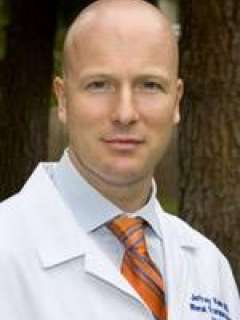Highlights:
- UCLA Health launched innovative kidney transplant program in 2014.
- To date, more than 1,000 kidneys have been donated through the program.
- About 90,000 people are awaiting kidney transplants in the U.S.
It sounded like an unusual idea: Coupons for kidneys.
However, Jeffrey Veale, MD, a kidney transplant specialist at UCLA Health, was intrigued.
A 64-year-old man wanted to donate a kidney to his 4-year-old grandson, who had chronic kidney disease but wouldn’t need an organ transplant for many years. The grandfather wondered if he could donate now, while he was healthy, and give his grandson a kind of “credit” to receive a kidney in the future.
Thus the kidney voucher program was born. Established at UCLA Health in 2014, the program has expanded to 78 other transplant centers across the country and is supported by the National Kidney Registry.
More than 1,000 kidneys have been donated under the voucher program to date. Dr. Veale and his colleagues recently published a study in the journal JAMA Surgery looking at the first 250 voucher donors. Six vouchers were redeemed and a total of 573 kidney transplants performed at the participating medical centers during the study period.
A donation chain
Here’s how the program works: A person wants to donate a kidney to a loved one, such as grandfather to grandson. The loved one, however, doesn’t yet need a transplant. The donor gives the organ anyway, making the kidney available to someone in need, and the loved one receives a voucher redeemable for a kidney in the future.
This starts a donation chain, Dr. Veale explains. Someone awaiting a kidney will receive the newly available organ, allowing someone else who needs a kidney to move up on the deceased-donor waiting list.

“So it takes one kidney and makes it into two, kind of,” Dr. Veale says.
About 90,000 people were awaiting kidney transplants in the U.S. as of April 2021, according to the U.S. Health Resources and Services Administration. Of the more than 22,800 kidney transplants performed nationally in 2020, about 5,200 organs came from living donors. The remainder came from deceased donors.
Most participants in the voucher program are family members of people with chronic kidney conditions, Dr. Veale says — many of them parents or grandparents. His study found that donors ranged in age from 19 to 78, with a median age of 46.
Maintaining a legacy
“There’s something there about inheritance,” Dr. Veale says. “I think they really want their legacy to continue for their kids and grandkids.”
Because the vouchers are good for life, a grandchild could benefit from a grandparent’s donation even after the grandparent’s death. Vouchers are non-transferable and may only be redeemed by the designated recipient.
In the previous example, just as the grandfather’s donated kidney benefits a stranger, the grandchild’s voucher entitles him or her to a stranger’s donated kidney should the need arise. Voucher holders are prioritized to receive a kidney from a living donor affiliated with the National Kidney Registry, which takes them off the deceased-donor waiting list and shortens the wait time for everyone in need of a kidney transplant.
The voucher recipient, however, may never end up needing a kidney, which means the original donation just increased the pool of available organs.
“It’s like you’re growing kidneys on trees,” Dr. Veale says. “It’s incredible.”
He says “UCLA had a lot of guts” being first to embrace the voucher concept. It’s been gaining support ever since, Dr. Veale says, describing the program as “the biggest innovation in kidney transplants in the last 20 years.”
Learn more about UCLA Transplantation Services.




